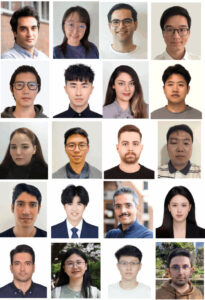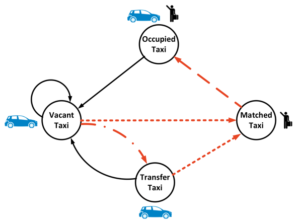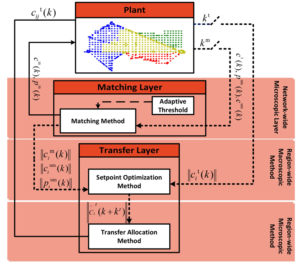Welcome to the Control Group of TransportLab at the University of Sydney.

Group YouTube Channel
https://www.youtube.com/channel/UC1VIPFbdw0cRK8J06DLaHEA
Team
PhD opportunity: We are always looking forward to working with the most talented and motivated students. If you are interested in research, please contact [email protected], attaching your latest CV.
Postdoc
- Dr. Ehsan Seyedabrishami; 2022 – 2023
- Dr. Hongjun Yu; 2022 – 2023
- Dr. Reza Mohajerpoor; 2018 – 2020
PhD
- Sylvia Zhao – Congestion modeling and control; 3/2025 – 2028
- Wenhui Yang – Operations of electrified fleets; 2/2025 – 2028
- Hamidreza Babaeighazvini – Predictive urban corridor control; 7/2024 – 2027
- Ruihao Zeng – Distributed intelligence in systems of autonomous vehicles; 3/2024 – 2027
- Elnaz Emami – Modelling and control of shared e-micromobility systems; 10/2022 – 2026
- Alireza Soltani – Traffic programming at intersections; 10/2022 – 2026
- Dr. Guipeng Jiao – Ride sharing in competitive markets; 3/2021 – 2025
- Dr. Yue Yang – Modeling and control of shared and automated e-hailing systems; 2021 – 2024
- Dr. Linji Chen – Management of ride-sourcing systems; 2020 – 2024
- Dr. Ye Li – Perimeter control and pricing using MFD; 2018 – 2022
MPhil
- Ruihao Zeng – Multi-object tracking with a moving sensor; 2022 – 2023
- Mengyuan (Derek) Zhu – Location-aware control of ride-sharing systems; 2020 – 2022
- Amir Hosein Valadkhani – Dispatching and relocation in ride-sourcing systems; 2017 – 2021
- Dong Zhao – Bus bunching modeling and control; 2017 – 2019
Co-supervision
- Arman Haghbayan (The University of Sydney; with David Levinson); 2025 – 2028
- Zhuopeng Xie (The University of Sydney; with David Levinson); 2023 – 2027
- Linda Belkessa (Université Gustave Eiffel Paris; with Mahdi Zargayouna and Mostafa Ameli); 2023 – 2026
- Abdullah Zare Andaryan (The University of Sydney; with Mike Bell); 2023 – 2026
- Jack Wang (The University of Sydney; with David Levinson); 2022 – 2025
- Dr. Ang Ji (The University of Sydney; with David Levinson); 2018 – 2021
- Dr. Mohammad Noaeen (University of Calgary; with Behrouz Far); 2016 – 2021
Visiting
- Omar Shahd (Beijing University of Technology); 2024 – 2025
- Riki Kawase (Tokyo Institute of Technology); 2024 – 2025
- Shuyan Jiang (South China University of Technology); 2024 – 2025
- Mobina Faqani (Sharif University of Technology); 2023 – 2024
- Dr. Claudio Roncoli (Aalto University); 2023
- Yu Han (TU Delft); 2016 – 2017
Transport modeling (MFD) and traffic control
- Wang, Z., Ramezani, M., & Levinson, D. (2024). How mandatory are ‘Mandatory’ lane changes? An analytical and experimental study on the costs of missing freeway exits, Transportation Research Part B. 186, 102994. (PDF) (Video abstract)
- Li, Y., & Ramezani, M. (2022). Quasi revenue-neutral congestion pricing in cities: Crediting drivers to avoid city centers. Transportation Research Part C, 145. (PDF) (Video abstract)
- Mohajerpoor, R., Cai, C., & Ramezani, M. (2022). Optimal traffic signal control of isolated oversaturated intersections using predicted demand. IEEE Transactions on Intelligent Transportation Systems. (PDF)
- Noaeen, M., Mohajerpoor, R., Far, B., & Ramezani, M. (2021). Real-time decentralized traffic signal control for congested urban networks considering queue spillbacks. Transportation Research Part C, 133. (PDF)
- Yildirimoglu, M., Ramezani, M., & Amirgholy, M. (2021). Staggered work schedules for congestion mitigation: A morning commute problem. Transportation Research Part C, 132. (PDF)
- Li, Y., Mohajerpoor, R., & Ramezani, M. (2021). Perimeter control with real-time location-varying cordon. Transportation Research Part B, 150, 101-120. (PDF) (Video abstract)
- Li, Y., Yildirimoglu, M., & Ramezani, M. (2021). Robust perimeter control with cordon queues and heterogeneous transfer flows. Transportation Research Part C, 126. (PDF) (Video abstract)
- Kumarage, S., Yildirimoglu, M., Ramezani, M., & Zheng, Z. (2021). Schedule-constrained demand management in two-region urban networks. Transportation Science, 55(4), 857-882. (PDF)
- Han, Y., Ramezani, M., Hegyi, A., Yuan, Y., & Hoogendoorn, S. (2020). Hierarchical ramp metering in freeways: An aggregated modeling and control approach. Transportation Research Part C, 110, 1-19. (PDF)
- Mohajerpoor, R., Saberi, M., Vu, H. L., Garoni, T. M., & Ramezani, M. (2020). H∞ robust perimeter flow control in urban networks with partial information feedback. Transportation Research Part B, 137, 47-73. (PDF)
- Yildirimoglu, M., & Ramezani, M. (2020). Demand management with limited cooperation among travellers: A doubly dynamic approach. Transportation Research Part B, 132, 267-284. (PDF)
- Mohajerpoor, R., Saberi, M., & Ramezani, M. (2019). Analytical derivation of the optimal traffic signal timing: Minimizing delay variability and spillback probability for undersaturated intersections. Transportation Research Part B, 119, 45-68. (PDF)
- Aalipour, A., Kebriaei, H., & Ramezani, M. (2019). Analytical Optimal Solution of Perimeter Traffic Flow Control Based on MFD Dynamics: A Pontryagin’s Maximum Principle Approach. IEEE Transactions on Intelligent Transportation Systems, 20(9), 3224-3234. (PDF)
- Ramezani, M., de Lamberterie, N., Skabardonis, A., & Geroliminis, N. (2017). A link partitioning approach for real-time control of queue spillbacks on congested arterials. Transportmetrica B: Transport Dynamics, 5(2), 177-190. (PDF)
- Ramezani, M., Haddad, J., & Geroliminis, N. (2015). Dynamics of heterogeneity in urban networks: aggregated traffic modeling and hierarchical control. Transportation Research Part B, 74, 1-19. (PDF)
- Yildirimoglu, M., Ramezani, M., & Geroliminis, N. (2015). Equilibrium analysis and route guidance in large-scale networks with MFD dynamics. Transportation Research Part C, 59, 404-420. (PDF)
- Haddad, J., Ramezani, M., & Geroliminis, N. (2013). Cooperative traffic control of a mixed network with two urban regions and a freeway. Transportation Research Part B, 54, 17-36. (PDF)
- Geroliminis, N., Haddad, J., & Ramezani, M. (2013). Optimal perimeter control for two urban regions with macroscopic fundamental diagrams: A model predictive approach. IEEE Transactions on Intelligent Transportation Systems, 14(1), 348-359. (PDF)
Modelling and control of point-to-point e-hailing services


- Jiao, G., & Ramezani, M. (2025). On the inefficiencies in the multi-platform e-hailing market with impatient customers. Transportation Research Part C: Emerging Technologies, 178, 105153. (PDF)
- Yang, Y., Umboh, S. W., & Ramezani, M. (2024). Freelance drivers with a decline choice: Dispatch menus in on-demand mobility services for assortment optimization. Transportation Research Part B, 190. (PDF) (Video abstract)
- Jiao, G., & Ramezani, M. (2024). A real-time cooperation mechanism in duopoly e-hailing markets. Transportation Research Part C, 162. (PDF) (Video abstract)
- Ramezani, M., & Valadkhani, A. (2023). Dynamic ride-sourcing systems for city-scale networks-Part I: Matching design and model formulation and validation. Transportation Research Part C, 152. (PDF)
- Valadkhani, A., & Ramezani, M. (2023). Dynamic ride-sourcing systems for city-scale networks, Part II: Proactive vehicle repositioning. Transportation Research Part C, 152. (PDF)
- Yang, Y., & Ramezani, M. (2022). A learning method for real-time repositioning in e-hailing services. IEEE Transactions on Intelligent Transportation Systems. (PDF) (Video abstract)
- Jiao, G., & Ramezani, M. (2022). Incentivizing shared rides in e-hailing markets: Dynamic discounting. Transportation Research Part C, 144. (PDF) (Video abstract)
- Ramezani, M., Yang, Y., Elmasry, J., & Tang P. (2022). An empirical study on characteristics of supply in e-hailing markets: a clustering approach. Transportation Letters, DOI: 10.1080/19427867.2022.2079869. (PDF) (Video abstract)
- Chen, L., Valadkhani, A., & Ramezani, M. (2021). Decentralised cooperative cruising of autonomous ride-sourcing fleets. Transportation Research Part C, 131. (PDF) (Video abstract)
- Nourinejad, M., & Ramezani, M. (2020). Ride-Sourcing modeling and pricing in non-equilibrium two-sided markets. Transportation Research Part B, 132, 340-357. (PDF)
- Hamedmoghadam, H., Ramezani, M., & Saberi, M. (2019). Revealing latent characteristics of mobility networks with coarse-graining. Scientific reports, 9(1), 7545. (PDF)
- Ramezani, M., & Nourinejad, M. (2018). Dynamic modeling and control of taxi services in large-scale urban networks: A macroscopic approach. Transportation Research Part C, 94, 203-219. (PDF)
Electric, connected and automated vehicles

- Soltani, A., Levinson, D. M., & Ramezani, M. (2025). Communication-free Distributed Control Algorithm for autonomous vehicles at intersections. Transportation Research Part C: Emerging Technologies, 180, 105309. (PDF) (Video abstract)
- Zeng, R., & Ramezani, M. (2025). A dynamic-confidence 3D multi-object tracking method based on spatio-temporal association. Measurement, 117864. (PDF) (Video abstract)
- Beza, A. D., Xie, Z., Ramezani, M., & Levinson, D. (2025). From lane-less to lane-free: Implications in the era of automated vehicles. Transportation Research Part C: Emerging Technologies, 170, 104898. (PDF)
- Xie, Z., Ramezani, M., & Levinson, D. (2024). Reduced-scale mobile robots for autonomous driving research. IEEE Transactions on Intelligent Transportation Systems. (PDF)
- Emami, E., & Ramezani, M. (2024). Integrated operator and user-based rebalancing and recharging in dockless shared e-micromobility systems. Communications in Transportation Research, 4. (PDF) (Video abstract)
- Ji, A., Ramezani, M., & Levinson, D. (2023). Pricing lane changes. Transportation Research Part C, 149. (PDF)
- Mohajerpoor, R., & Ramezani, M. (2019). Mixed flow of autonomous and human-driven vehicles: Analytical headway modeling and optimal lane management. Transportation Research Part C, 109, 194-210. (PDF)
- Ramezani, M., & Ye, E. (2019). Lane density optimization of automated vehicles for highway congestion control. Transportmetrica B: Transport Dynamics, 7(1), 1096-1116. (PDF)
- Jing, W., Ramezani, M., An, K., & Kim, I. (2018). Congestion patterns of electric vehicles with limited battery capacity, PloS one, vol. 13, no. 3, e0194354. (PDF)
- Jing, W., An, K., Ramezani, M., & Kim, I. (2017). Location design of electric vehicle charging facilities: A path-distance constrained stochastic user equilibrium approach, Journal of Advanced Transportation. (PDF)
- Ramezani, M., & Geroliminis, N. (2015). Queue profile estimation in congested urban networks with probe data. Computer‐Aided Civil and Infrastructure Engineering, 30(6), 414-432. (PDF)
- Ramezani, M., & Geroliminis, N. (2012). On the estimation of arterial route travel time distribution with Markov chains. Transportation Research Part B, 46(10), 1576-1590. (PDF)

